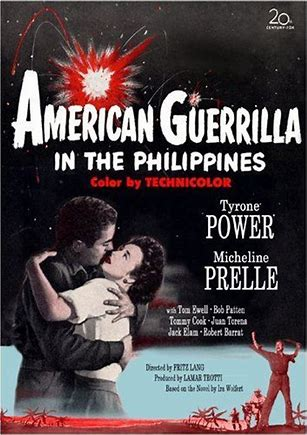Drawing on his own experiences of flight and exile, Fritz Lang’s
American Guerilla in the Philippines is a sweaty, sun-baked variation
on his foreboding urban narratives, its protagonist as hopelessly trapped as in any of them, in this
case fighting an all-but-endless war while devoid of almost any personal agency
or any sense of the passage of time. Tyrone Power’s Chuck Palmer is one of a
small group of Americans trapped in the islands after the US withdraws in the
face of the 1942 Japanese invasion (General MacArthur’s parting declaration,
printed on matchboxes, that “I shall return” comes to seem like as much an
existential taunt as an inspiring promise) – he treks for weeks in search of
others, has an idea of sailing to Australia which goes
nowhere, and from there is gradually drawn into the prolonged, lonely, constantly
threatened guerilla existence. Micheline Presle (billed here, in a wondrous
example of dumbing-down, as “Micheline Prelle”) plays a Frenchwoman married to
a local businessman who channels money and support to the guerillas; once he’s identified
and killed by the Japanese, she and Palmer rapidly become a couple, a transition
depicted with notable lack of sentiment (she’s depicted as being unerringly
pragmatic, and gets to wield a gun in the final showdown in a church, as does
one of the altar boys). The movie has a huge amount of action and incident, with
Palmer required to do everything from building a radio with whatever’s on hand
(which he succeeds at) to operating on a horribly injured man (he fails), but the
flag-waving is offset by its protagonist’s essential loneliness, with only one
other American, played by Tom Ewell, depicted in any depth; when the troops triumphantly
roll in at the end, they watch from the perspective of liberated locals rather than as part of the team.


No comments:
Post a Comment